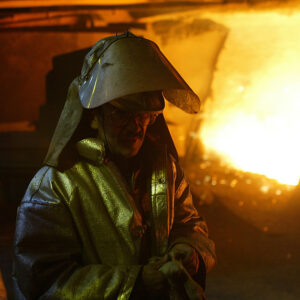The Biden administration has proven to be the gang that can’t shoot straight.
The president’s signature economic policy has led to a perfect storm of spending, debt and inflation. Other misguided policies have undermined U.S. energy security, created immigration chaos and a more porous border, and weakened our standing abroad while emboldening our enemies.
Meanwhile, one of the few areas of bipartisan consensus, supporting and repatriating American manufacturing, has been undermined by regulators within the administration.
Although the White House touts the massive sums of money allocated to support innovation and manufacturing in major legislation such as the Inflation Reduction Act and the CHIPS Act, its Environmental Protection Agency has simultaneously proven itself to be an obstacle to such efforts. The experience of the steel industry, in particular, exemplifies the contradiction that is being perpetrated.
While a series of provisions in these bills requires domestically produced steel to be used for the public projects they fund and proposed changes to Section 232 of the Trade Expansion Act would tighten trade regulations and impose tariffs on imported foreign steel products, the EPA’s recent decisions have hindered steel makers’ ability to supply domestically produced steel for industry and infrastructure.
In June, the agency proposed rules for steel mills that require them to cut emissions by 79 tons per year, a 15 percent reduction. While there is nothing wrong with commonsense and cost-effective steps to improve the air quality of domestic manufacturing operations, such drastic requirements are penny-wise and pound-foolish, and they will hurt companies’ ability to supply other domestic industries with much-needed steel.
For example, in the face of import restrictions and a steady growth in consumer demand, auto manufacturers have increasingly turned to domestically manufactured steel to keep their assembly lines moving. The story is the same for countless other consumer products. Additional operating costs and overbearing regulations for steel companies would cause a trickle-down effect along the supply chain and raise prices. With the average price of a new automobile skyrocketing to $48,000 and a slew of other pressures confronting families, regulators should be doing what they can to keep prices in check.
Not only are these actions economically damaging but they may also run against the law. American manufacturers, and the steel industry in particular, have alleged that the EPA is failing to act with scientific backing and that the policies it is pushing exceed the authority granted to the agency by the Clean Air Act.
Specifically, the EPA’s “Good Neighbor Plan” and its “test and set” provisions have been criticized in a recent court filing as “legally, technically, factually, and procedurally flawed.” An “illegal work-around of requiring owners and operators to install controls,” the provisions were instituted only after the initial emissions limits for steel furnaces proposed as part of the Good Neighbor Plan had no legal basis.
Since the EPA has not specified what emissions levels would constitute a violation of this rule after their first set of guidelines were scrapped, these new “test and set” policies would make compliance subjective to the whims of regulators. Not only would these rules force manufacturers to spend millions to install compliance equipment at facilities that may or may not violate emissions standards, but they would also allow the EPA to set specific limits after the fact without testing for the infractions themselves.
In essence, this would create a new regulatory regime where steel mills would have no way to know whether they are operating within the law and where companies would be faced with the threat of fines and violations until such time as the EPA decides to set a new round of arbitrary and capricious emissions standards.
It is unfair and, frankly, a little crazy to ask any business to operate under such an inconsistent and inequitable patchwork of regulations. If the administration wants to institute an actual good neighbor policy and bolster its “Buy American” efforts, it will instead find ways to better partner with manufacturers and temper such hasty actions against manufacturers more generally.
Please follow DVJournal on social media: Twitter@DVJournal or Facebook.com/DelawareValleyJournal

